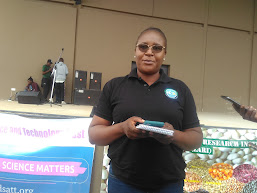TAKE INTEREST IN GMO, GENOME-EDITING RESEARCH AND DEVELOPMENT
....Science ideas which are not backed by scientific evidence are ultimately rejected-NBA
By Alfonso Kasongo
Amidst controversy surrounding the introduction of live genetically modified organisms and other related biotechnological bred products in the agriculture sector,Zambia's biotechnology regulator has assured the nation that the country has the capacity in form of human resource and infrastructure not only to regulate the gene science but also its application in research and development, content use as well as placing GM products on the market.
This came to light when National Biosafety Communications Officer, Sandra Lombe,on behalf of the Authority Chief Executive Officer, Lackson Tonga, disclosed that Zambia currently has seven biotechnology laboratories with the capacity to detect the required amount of GMOs safe for both human and animal health and environment through risk assessments.
GMOs are organisms whose genetic material has been artificially altered by inserting a piece of foreign DNA. This DNA may be synthetic in origin or sourced from other organisms to introduce new traits or characteristics in the altered plant. Gene editing also called Genome-editing involves making precise changes to an organism's genome without the integration of foreign DNA elements with the same view of improving some traits.
Arguably among the pro and anti biotechnology scientists,genetic modification (GM) and genome editing (GE) can improve plant traits to achieve sustainable agriculture objectives which have the potential to reduce the need for additional agricultural land, reduce the use of chemicals in the form of fertilizers, pesticides, and herbicides, reduce greenhouse gas emissions to combat climate change, conserve natural resources, and improve human health outcomes.
And the anti biotechnology scientists have continued to dispel the above claims especially on the health aspect that GM foods are not safe for humans and animal health and the environment.
Participating in the 'Evidence Based Science Matters Walk' organised by the Dziwa Science and Technology Trust ( DSaT),with the call for local scientists to demystify science and make evidence based science available to influence policy and solve country's socio-economic challenges including effects of climate change, Ms. Lombe implored local scientists to take interest in research and development on GMOs.
The NBA believes doing so will not only help the country archive enough local scientific evidence which are for or against gene science for the public to make informed decisions but also help people believe in the science.
 |
| Ms Sandra Lombe-NBA public communication Officer |
Despite the country grappling with uncontrollable uncertainties and misconceptions on GMOs, the NBA is optimistic that science based evidence remains key to clear the doubts on biotechnology.
Ms. Lombe explained... "Evidence based science is very important as science ideas are testable by many different people. Scientific evidence is important because the acceptance and rejection of a science idea depends upon the sceintific evidence that is produced."
"Ideas that are not supported by scientific evidence are ultimately rejected," She added.
This is why the regulatory agency has been emphasising on the need to provide scientific evidence based comment during public consultation, Ms. Lombe stressed.
"As earlier alluded to, the Authority's mandate is to regulate matters related to GMOs, therefore in our regulation, we do not leave out science based evidence to answer the uncertainties and misinformation on biotechnology."
We encourage public to participate every time we call for public consultation."
And DSaT Founder and Chief Executive Officer, Veronica Mwaba observes with concern that science stories are being overshadowed by politics, entertainment and sports,attributing the cause and poor acceptance of new scientific techniques to scientists' skepticism on sharing information.
Ms. Mwaba has observed that local scientists only share information through peer-to-peer, the situation she says has hindered the dissemination of important scientific evidence to trigger policy shift to solve some of the problems the country face.
 |
| Ms Veronica Mwaba-DSaT Founder addressing journalists during the science walk activities |
She adds that the development has since led to shelving of the most crucial information in the journals.
"In this regard, DSaT has come up with initiatives that will help improve information dissemination and communication."
"One of the initiatives is the Walk for Science. This is the reason why we are gathered here today. The event has brought together scientists from different specialised disciplines and the media. The objective of the Walk for science agenda is to build partnerships with scientists as key sources of information," Ms. Mwaba said.
Meanwhile the Zambia Alliance for Agro-ecology and Biodiversity (ZAAB) says it joins other members of the public who are seriously concerned by the lack of genuine efforts by the National Biosafety Authority to prioritize and protect public interest.
The Alliance says it has observed that the frequent “Communications” of the NBA are biased towards promoting GM technology, whilst the basic human rights and access to meaningful information is not being fulfilled.





Comments